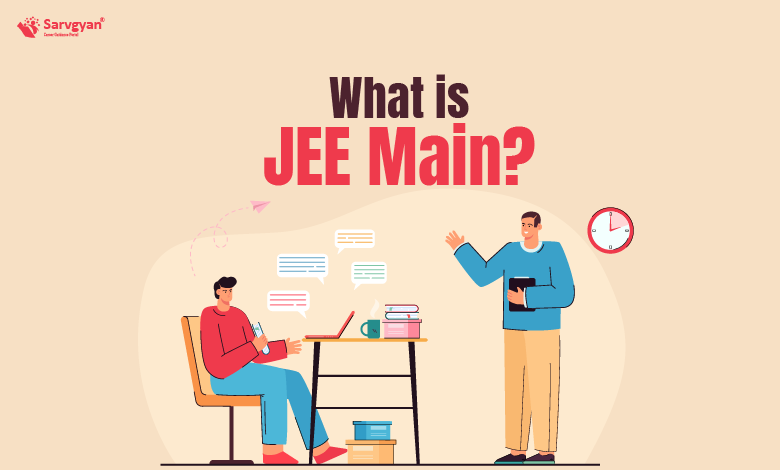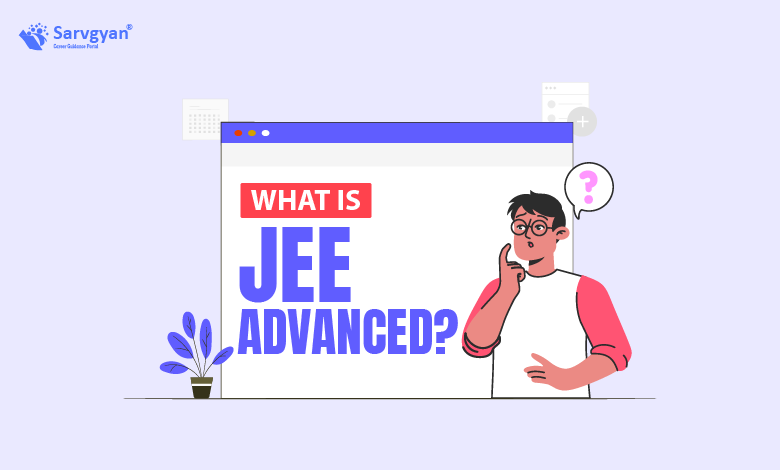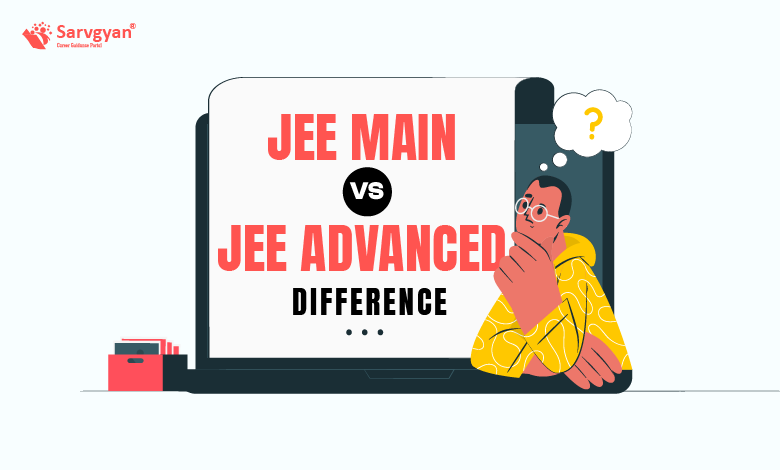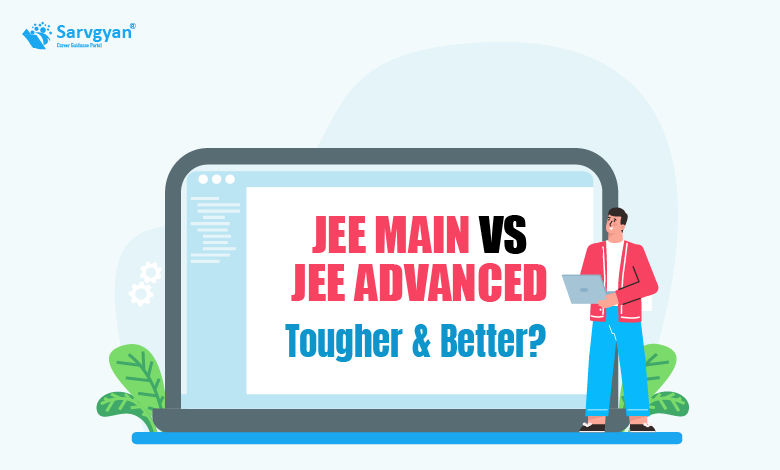In India, choosing between medical and engineering is one of the most important decisions students face after Class 10. For those from the PCM stream, the focus usually shifts toward engineering, and with that comes the question: JEE Main or JEE Advanced?
JEE Main 2026 V | S JEE Advanced 2026 |
JEE Main 2026 Latest Update: Registration Open for Session 2. Apply Here >>
JEE Advanced 2026 Latest Update: Information brochure has been released by IIT Roorkee
Authorities conduct JEE Main and Advanced as national-level entrance exams to provide admission to top Engineering institutes such as NITs, IIITs, GFTIs, and the prestigious IITs across the nation.
Let’s discuss the confusion and differences between those, as they serve different purposes, follow different structures, and lead to different institutes.
They also differ in terms of difficulty, eligibility criteria, exam patterns, and college opportunities. Go through this article to find all the answers regarding JEE Main vs. JEE Advanced.
Whats Your Doubt? Ask Us
What is JEE Main?

JEE Main, also known as the Joint Entrance Examination Main, is a national-level entrance exam. It is conducted by the National Testing Agency (NTA) twice a year in January and April. The purpose of the exam is:
- Admission to top engineering colleges like NITs, IIITs, and GFTIs.
- As a qualifying exam for JEE Advanced, required for admission to IITs.
JEE Mains is a qualifying examination for JEE Advanced and as an entrance test for admissions to NITs, IIITs, and other centrally funded technical institutions.
What is JEE Advanced?

JEE Advanced, also known Joint Entrance Examination Advanced. It is a national-level engineering examination conducted by one of the Indian Institutes of Technology (IITs) on a rotational basis each year.
JEE Advanced is a gateway to admission in the 23 prestigious IITs across India and the second stage of the Joint Entrance Examination of JEE Main.
The authorities conduct this examination once a year, and only JEE Main candidates are eligible to appear for JEE Advanced.
What is Difference between JEE Main & JEE Advanced
Below, in the table, we have provided you with the differences between JEE Main vs JEE Advanced.

JEE Main Vs Advanced: Key Differences
| Feature | JEE Main | JEE Advanced |
| Purpose | Admission to NITs, IIITs, GFTIs + eligibility for JEE Advanced | Admission to IITs only |
| Conducted By | NTA (National Testing Agency) | IITs (rotational); IIT Madras in 2025 |
| Exam Frequency | Twice a year – January & April | Once a year – May |
| Eligibility | 12th pass with 75% marks or top 20 percentile | Top 2.5 lakh JEE Main rankers + age + 12th marks |
| Attempts Allowed | Max 6 attempts (2 per year for 3 consecutive years) | Max 2 attempts in 2 consecutive years |
| Exam Level | Moderate to High; NCERT-based MCQs & numerical value questions | Very High; concept-based, logical, multi-step problems |
| Subjects Covered | Physics, Chemistry, Mathematics | Physics, Chemistry, Mathematics |
| Syllabus | NCERT Class 11 & 12 | NCERT + additional topics; questions are deeper & conceptually intense |
| Mode of Exam | Paper 1 (B.E./B.Tech): CBT mode. Paper 2A (B.Arch): Mathematics and Aptitude in CBT mode; Drawing conducted offline (pen and paper). Paper 2B (B.Planning): CBT mode. | Paper 1 and Paper 2 in Computer-Based Test (CBT) mode |
| Medium of Exam | Online | Online |
| Language of Paper | English, Hindi, and 11 regional languages: Assamese, Bengali, Gujarati, Kannada, Marathi, Malayalam, Odia, Punjabi, Tamil, Telugu, Urdu | English and Hindi only |
| Duration of Exam | 3 hours | 6 hours total (2 papers of 3 hours each) |
| Total and Types of Types | MCQs and Numerical Value Questions | MCQs, Integer type, Match the Following, Assertion-Reason, Paragraph types |
| Number of Questions | Paper 1 and Paper 2 of JEE Advanced have 48 questions each, with 16 questions from Physics, 16 from Chemistry, and 16 from Mathematics in both papers. Together, Paper 1 and Paper 2 have a total of 96 questions. | |
| Marking Scheme | +4 for correct, −1 for incorrect (MCQ); no negative for numericals | Varies by paper; includes partial marking and negative marking |
| Seat Intake (Approx.) | 59,917 at various institutions (NITs, IIITs, GFTIs) | 18,160 seats across IITs |
| Counselling Process | Conducted through JoSAA for NITs, IIITs, GFTIs + CSAB special & spot rounds (if seats remain) | Conducted only through JoSAA for IITs |
JEE Main vs JEE Advanced Which Exam is Tougher?
There are two stages in the Joint Entrance Examination (JEE): JEE Main and JEE Advanced. Both exams are moderately difficult, but due to a few factors, students consider the JEE Advanced tougher.
The JEE Main exam is based on the Class 11 and 12 NCERT syllabus. Questions are mostly direct and formula-based. For B.E./B. Tech aspirants, JEE Main Paper 1 consists of three subjects: Physics, Chemistry, and Mathematics, with a total of 75 questions (25 from each subject).
The authorities conduct the exam for a duration of 3 hours, and it focuses primarily on speed, accuracy, and concept application.
On the other hand, JEE Advanced examination drives more on concepts and includes questions that often go beyond the NCERT syllabus, testing a deeper understanding of topics. JEE Advanced includes two compulsory papers, each of 3 hours.
In addition, questions are typically multi-conceptual, designed to assess logical reasoning, conceptual integration, and problem-solving abilities at an advanced level.

Which is better, JEE Mains or Advanced?
It’s not about one exam being “better” than the other; it depends entirely on your career goals and what you’re aiming for. So instead of asking “Which is better JEE Main or JEE Advanced?”, know which one is better for me, JEE Main or JEE Advanced?.
When we talk about JEE Main, its primary purpose is to provide admission to National Institutes of Technology (NITs), Indian Institutes of Information Technology (IIITs), and Government Funded Technical Institutes (GFTIs). It also acts as the qualifying exam for JEE Advanced.
On the other hand, JEE Advanced most prestigious engineering institutions in India. Furthermore, the Indian Institutes of Technology (IITs) use it specifically for admission.
To summarise, if you want to get into an IIT, then JEE Advanced is your path, and JEE Main is the essential first step. On the other hand, if you’re targeting NITs, IIITs, or other top government engineering colleges, JEE Main alone is the exam you need to focus on.
Frequently Asked Questions (FAQs)
Below is our comment section, where you may ask us any doubts, questions, or queries regarding the JEE Main and JEE Advanced examinations.